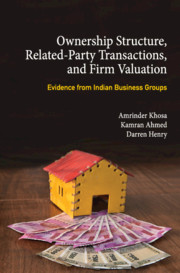 Ownership Structure, Related Party Transactions, and Firm Valuation
Ownership Structure, Related Party Transactions, and Firm Valuation Book contents
- Frontmatter
- Contents
- List of Tables
- 1 Introduction
- 2 The Evolution of Business Groups, Institutional Framework in India, and Related-Party Transactions
- 3 Theory and Literature Review
- 4 Hypotheses Development
- 5 Research Methods
- 6 Descriptive Statistics
- 7 Empirical Results
- 8 Additional Tests
- 9 Implications of the Study and Conclusion
- Appendix 1 List of Sample Firms
- Appendix 2 List of Business Groups
- References
- Index
1 - Introduction
Published online by Cambridge University Press: 26 April 2019
- Frontmatter
- Contents
- List of Tables
- 1 Introduction
- 2 The Evolution of Business Groups, Institutional Framework in India, and Related-Party Transactions
- 3 Theory and Literature Review
- 4 Hypotheses Development
- 5 Research Methods
- 6 Descriptive Statistics
- 7 Empirical Results
- 8 Additional Tests
- 9 Implications of the Study and Conclusion
- Appendix 1 List of Sample Firms
- Appendix 2 List of Business Groups
- References
- Index
Summary
Expropriation by controlling shareholders is an important issue in emerging economies. Concentrated ownership and family dominance in Indian business groups make outside investors vulnerable to expropriation. Furthermore, weak investor protection makes the Indian setting more conducive for the expropriation of minority shareholders. This book investigates whether inside-concentrated ownership provides opportunities for expropriation of minority shareholders and results in value loss. To provide evidence, we examine the market valuation of ownership rights and related-party transactions (RPTs) of group-affiliated firms in India.
This chapter begins by highlighting the group structure and its inherent problems. The second section describes the underlying motivation of the book, followed by a section that outlines the main research objectives. The fourth section highlights the contribution of the book, and the final section outlines how the book is organized.
Statement of the problem
The business group structure has a significant impact not only on emerging economies but also on developed nations such as the US and Japan. Although business groups have contributed significantly to the wealth of emerging economies, our understanding of the operations of these groups remains insufficient (Yiu et al., 2005). This study expands our understanding of the concentrated ownership, and RPT phenomenon within business groups in India, which is one of the fastest emerging economies in the world. Khanna and Yafeh (2005) identify that the role of business groups in India is poorly understood. As the existence of concentrated ownership is the primary feature of business groups, business-group membership can affect firm value in one of two competing ways: the entrenchment effect and the alignment effect. The entrenchment effect presents incentives for controlling shareholders to expropriate the wealth of minority shareholders (Fama and Jensen, 1983b). The alignment effect presents the competing view that concentrated ownership creates greater monitoring by controlling shareholders and, thus, higher firm value (Demsetz and Lehn, 1985). This study disentangles the incentive and entrenchment effects of controlling shareholders of Indian group firms. Specifically, the effect of the controlling shareholders’ direct and indirect ownership rights on firm value is examined to seek evidence on the alignment or entrenchment effects. This study also examines whether differences in ownership structure at the firm level can explain the variation in the value relevance of RPTs. In particular, this study examines whether the use of RPTs is viewed as efficient and valued positively, or entrenchment and valued negatively.
- Type
- Chapter
- Information
- Ownership Structure, Related Party Transactions, and Firm ValuationEvidence from Indian Business Groups, pp. 1 - 9Publisher: Cambridge University PressPrint publication year: 2019


